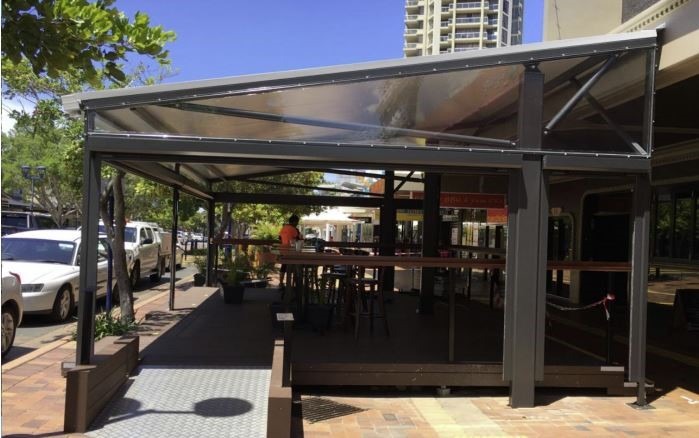Insulated Panel Roofing for Commercial Developments
In the competitive world of commercial property development, providing functional and attractive outdoor spaces can significantly enhance the appeal and usability of a property. Businesses, tenants, and visitors increasingly value shaded outdoor areas, whether for relaxation, meetings, or operational purposes. Among the many solutions available, insulated panel roofing and polycarbonate roofing have emerged as two standout options for creating durable, efficient, and visually appealing shade structures. This article explores the role of insulated panel roofing and polycarbonate roofing in commercial developments, delving into their benefits, applications, and how they align with modern sustainability goals. The Growing Importance of Outdoor Shade in Commercial Developments Commercial developments today face heightened expectations from businesses and consumers alike. In places like Brisbane, where the climate includes scorching summers and unpredictable storms, shaded outdoor spaces are not a luxury—they’re a necessity. They offer more than just protection from the elements; they create an inviting atmosphere, enhance the functionality of outdoor areas, and add significant value to the property. Whether it’s a shopping centre courtyard, a hotel, or a loading bay for industrial facilities, well-designed shade structures improve user experience while ensuring durability and cost-efficiency for the property owner. Insulated Panel Roofing: A Premium Solution for Shade Structures What Is Insulated Panel Roofing? Insulated panel roofing consists of a core layer of insulating material—usually polystyrene or polyurethane—sandwiched between two metal sheets. This design offers superior thermal performance, weather resistance, and durability compared to traditional roofing materials. Applications in Commercial Developments Office Courtyards and Breakout Areas: In corporate settings, outdoor spaces for staff relaxation and informal meetings are highly desirable. Insulated panel roofing ensures these areas are comfortable year-round by regulating temperature, reducing heat in summer and retaining warmth in winter. Retail Complexes and Shopping Centres: Outdoor courtyards, walkways, and seating areas in shopping centres benefit immensely from insulated roofing. These structures not only protect customers from sun and rain but also contribute to lower energy costs by reducing the need for air conditioning in nearby indoor spaces. Industrial Loading Bays: For warehouses and logistics hubs, insulated panel roofing provides practical benefits such as temperature control for goods and a safe, shaded environment for workers. Its durability makes it ideal for high-traffic areas requiring minimal maintenance. Key Benefits of Insulated Panel Roofing Energy Efficiency: The insulating core significantly reduces heat transfer, leading to lower energy consumption for climate control. Weather Resistance: It withstands extreme weather conditions, including heavy rain, hail, and high winds, which are common in Queensland. Aesthetic Appeal: Insulated panels come in a variety of finishes and colours, enabling developers to create modern and stylish shade structures. Cost Savings: With its low maintenance requirements and long lifespan, insulated roofing offers an excellent return on investment. Polycarbonate Roofing: The Lightweight, Versatile Option What Is Polycarbonate Roofing? Polycarbonate roofing is made from a lightweight, transparent, and highly durable plastic. Known for its flexibility and UV resistance, it is commonly used in structures that require natural light without compromising on protection. Applications in Commercial Developments Shopping Centre Walkways:Polycarbonate roofing allows natural light to flood walkways and entrance areas, creating an open and welcoming environment while protecting shoppers from the elements. Rooftop Gardens and Atriums: In commercial office buildings, polycarbonate is often used for rooftop spaces and atriums, combining aesthetic appeal with practicality. Canopies for Outdoor Retail Spaces: For outdoor retail markets or pop-up stores, polycarbonate roofing provides lightweight and visually striking coverage. Key Benefits of Polycarbonate Roofing Light Transmission: Polycarbonate panels can transmit up to 90% of natural light, reducing the need for artificial lighting during the day. Impact Resistance: Highly durable, it can withstand impacts from hail and debris, making it suitable for high-traffic commercial areas. Design Flexibility: Its lightweight nature allows for creative architectural designs, including curved and custom shapes. UV Protection: Many polycarbonate panels are treated with UV-blocking layers, protecting users and goods from harmful rays. Insulated Panel Roofing vs. Polycarbonate Roofing: Which One to Choose? Both insulated panel roofing and polycarbonate roofing offer unique advantages, and the choice largely depends on the specific requirements of the project. Thermal Performance Insulated panels are unmatched in thermal insulation, making them the ideal choice for areas where temperature control is crucial. On the other hand, polycarbonate excels in applications where natural light is a priority, such as atriums and walkways. Durability While both materials are highly durable, insulated panels have a longer lifespan and are better suited for areas exposed to extreme weather. Polycarbonate’s durability is adequate for lighter-duty applications but may require more frequent replacements in heavy-use environments. Aesthetic Considerations Insulated panels offer a clean, modern look with a variety of finishes, while polycarbonate’s transparency or translucent options create a bright and airy aesthetic. Combining the two materials in a single development can achieve the best of both worlds. Sustainability Benefits of Modern Shade Structures Sustainability is a growing concern in commercial development, and both insulated panel and polycarbonate roofing contribute to eco-friendly designs. Energy Savings: Insulated panels reduce energy consumption by maintaining consistent temperatures, while polycarbonate minimises the need for artificial lighting. Recyclability: Both materials are recyclable, reducing the environmental impact at the end of their lifecycle. Compliance with Green Building Standards: Incorporating these materials can help developments achieve certifications like Green Star or LEED, enhancing their marketability. Conclusion Insulated panel roofing and polycarbonate roofing are versatile, efficient, and sustainable solutions for commercial developments. By carefully considering the unique needs of the project, developers can create shaded outdoor spaces that enhance property value, user experience, and operational efficiency. Whether it’s a retail complex, office building, or industrial facility, incorporating these roofing options is an investment in the future, providing long-term benefits that meet both functional and aesthetic goals. As Brisbane continues to grow, adopting these innovative shade solutions will ensure that commercial properties remain competitive and appealing in a dynamic market.




